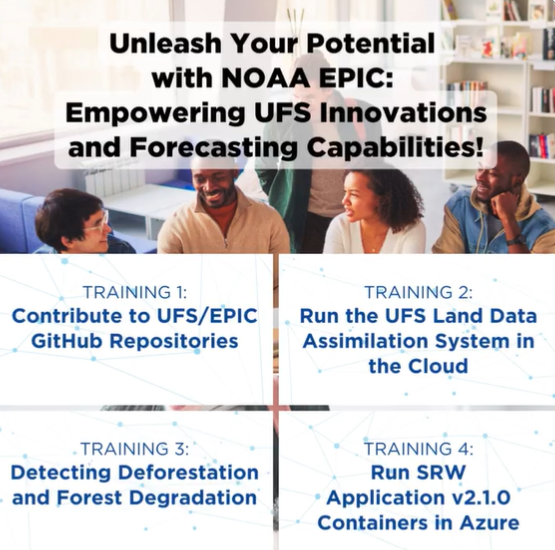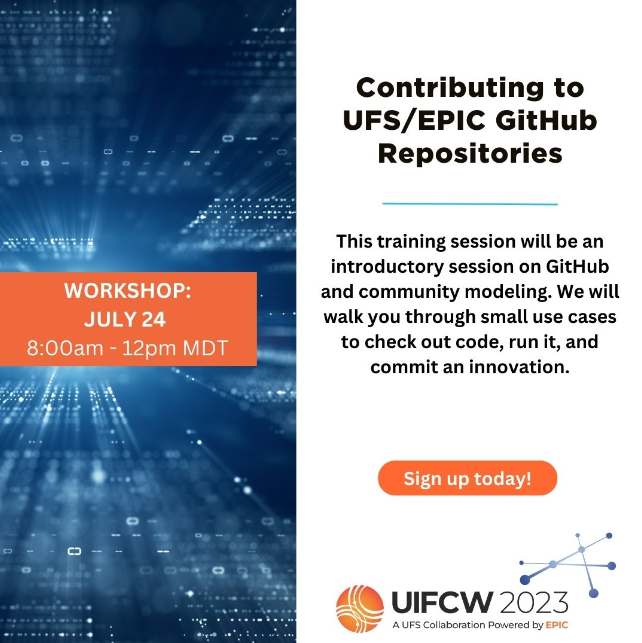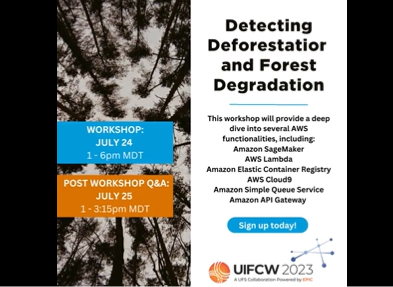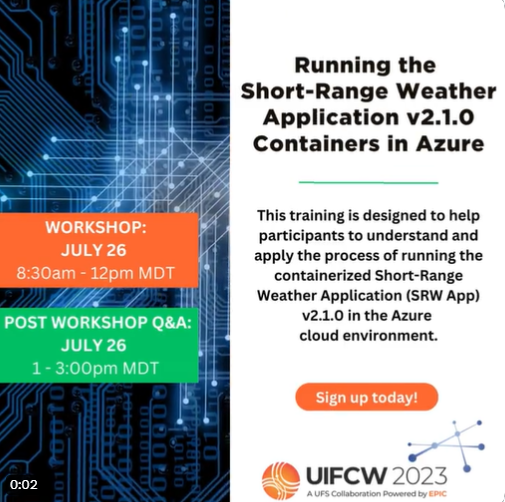The Unifying Innovations in Forecasting Capabilities Workshop (UIFCW) is holding four FREE virtual training sessions July 24-26 during #UIFCW23. You are invited to accelerate your impact on weather modeling with EPIC’s hands-on workshops.
Unleash your potential with NOAA EPIC and empower innovations and forecasting capabilities with the Unified Forecast System (UFS). Learn how to run the UFS Land Data Assimilation System in the Cloud. Gain experience using AWS cloud services to detect changes in geospatial images and contribute to UFS’s mission. Find out how to run the Short-Range Weather (SRW) Application v2.1.0 contaners in Azure and advance SRW prediciton capabilities.
There are limited spots available! Sign up below with the register button for each training workshop.
FREE Virtual Training Workshops #UIFCW23 – July 24-26

Training 1 | Contributing to UFS/EPIC GitHub Repositories
Monday, July 24, 2023
8:00 am – 12:00 pm MDT
Does the process of getting started with the Unified Forecast System (UFS) seem daunting? For many new members of the UFS community, the learning curve can feel steep. This training session will be an introductory session on GitHub and community modeling. We will walk you through small use cases to check out code, run it, and commit an innovation. This training will give you an in-depth understanding of what it takes to be a part of the community and contribute your great ideas to advance UFS weather modeling.
Objective | Community members will learn to contribute to the UFS weather model and applications. We will show you how easy it is to start building, running, innovating, and contributing to the repositories in a small or large way.
Hosted via Google Meet. Limited to 30 in-person attendees.


Training 2 | Running UFS Land Data Assimilation (DA) System v1.1.0 in the Cloud
Monday, July 24, 2023
8:00 am – 12:00 pm MDT
Participants can expect a walk-through of the system and a demo of how to run public release v1.1.0, which includes updates currently available at the head of the UFS land-DA_workflow development branch. In the Land DA System, the Noah-MP land surface model (LSM) and the Joint Effort for Data assimilation Integration (JEDI) software stack are used to assimilate snow depth data via the Local Ensemble Transform Kalman Filter-Optimal Interpolation (LETKF-OI) algorithm. This training will show community members how to log into a HeadNode via a cloud service provider, run the Land DA System in the cloud, and evaluate output. Community members will walk away with source code to be able to replicate this on their own after the event as well. Learn more about Land DA here.
Objective | In this training session, participants will learn how to use Land DA.
Hosted via Google Meet. Limited to 30 in-person attendees.
Training 3 | Detecting Deforestation and Forest Degradation | Post Workshop Q&A
Monday, July 24, 2023
1:00 pm – 6:00 pm MDT | Workshop – Detecting Deforestation and Forest Degradation
Description | The Earth Prediction Innovation Center (EPIC) has partnered with Amazon Web Services (AWS) to offer an immersive, two-part cloud technology training hosted by AWS representatives. This training will enable participants to visualize and detect changes in geospatial images using the Sentinel-2 dataset from the Amazon Sustainability Data Initiative (ASDI). The two sessions, entitled “SageMaker Notebook for Advanced Visualizations” and “Build Web Application with AWS Services,” will provide hands-on training with Amazon SageMaker, AWS Lambda, Amazon Elastic Container Registry (ECR), AWS Cloud9, Amazon Simple Queue Service (Amazon SQS), Amazon API Gateway, and more. This training highlights EPIC’s commitment to advance the Unified Forecast System (UFS) by leveraging the power of cloud technology.
For an overview of the workshop please visit: AWS Hosted Event.
Objective | This workshop aims to bridge the gap between the scientific weather community’s expertise in numerical weather prediction (NWP) and the practical application of AWS cloud services. At the end of the workshop, scientists, researchers, and contributors to the UFS will have a practical understanding of many useful AWS functionalities. By integrating their NWP expertise with AWS cloud technology, participants will be poised to enhance their contributions to the UFS significantly, fostering advancements in numerical weather forecasting capabilities.
Limited to 30 in-person attendees. Hosted via Google Meet for hybrid and virtual attendees.
Tuesday, July 25, 2023
1:00 pm – 3:15 pm MDT | Post-Workshop Q&A – Detecting Deforestation and Forest Degradation
Description | This Q&A session will be facilitated by our AWS representatives. The session will provide an opportunity for participants to clarify doubts and seek personalized assistance regarding the application of AWS technology to NWP. This face-to-face interaction is designed to supplement participants’ learning from the workshop, address any challenges encountered, and provide further insights into AWS functionalities and their role in enhancing the UFS.
Objective | The primary objective of this open session is to reinforce the knowledge acquired from the AWS workshop, enabling a smoother transition of theoretical understanding to practical application. Through personalized assistance, we aim to ensure that participants fully grasp the AWS concepts, empowering them to successfully integrate these tools within their scientific contributions to NWP technology.
Limited to 30 in-person attendees. Hosted via Google Meet for hybrid and virtual attendees.


Training 4| Running the Short-Range Weather (SRW) Application v2.1.0 Containers in Azure with Post-Workshop Q&A
Wednesday, July 26, 2023
8:30 am – 12:00 pm MDT | Workshop – Running the Short-Range Weather (SRW) Application v2.1.0 Containers in Azure
Description | The Earth Prediction Innovation Center (EPIC) is teaming up with Microsoft Azure to present an engaging workshop in cloud technology. This training is designed to enable participants to understand and apply the process of running the containerized Short-Range Weather (SRW) Application (App) v2.1.0 in the Azure cloud environment. Facilitated by Azure experts, this workshop will provide a thorough guide to deploying and managing containers using Azure Container Instances. We will also be learning about AZ-Hop, which is Azure’s HPC on-demand platform where users can easily set up the infrastructure to run Unified Forecast System (UFS) applications. This aligns with EPIC’s goal to expand the UFS by harnessing the potential of diverse cloud technologies.
Objective | This workshop is designed to connect the scientific weather community’s proficiency in SRW prediction with the practical application of Azure cloud services. Participants will acquire a comprehensive understanding of several Azure services and how to apply them to the SRW App. The integration of their SRW expertise with Azure cloud technology will position them to significantly augment their contributions to the UFS, ensuring improvements in SRW prediction capabilities.
Limited to 30 in-person attendees. Hosted via Google Meet for hybrid and virtual attendees.
Wednesday, July 26, 2023
1:00 pm – 3:15 pm MDT | Post-Workshop Q&A – Running the Short-Range Weather (SRW) Application v2.1.0 Containers in Azure
Description | This Q&A session will be facilitated by our Azure representatives. The session will provide an opportunity for participants to clarify doubts and seek personalized assistance regarding the application of Azure technology to SRW App v2.1.0 Containers. This face-to-face interaction is designed to supplement participants’ learning from the workshop, address any challenges encountered, and provide further insights into Azure functionalities and their role in enhancing the UFS.
Objective | The primary objective of this open session is to reinforce the knowledge acquired from the Azure workshop, enabling a smoother transition of theoretical understanding to practical application. Through personalized assistance, we aim to ensure that participants fully grasp the Azure concepts, empowering them to successfully integrate these tools within their scientific contributions to NWP technology.
Limited to 30 in-person attendees. Hosted via Google Meet for hybrid and virtual attendees.







